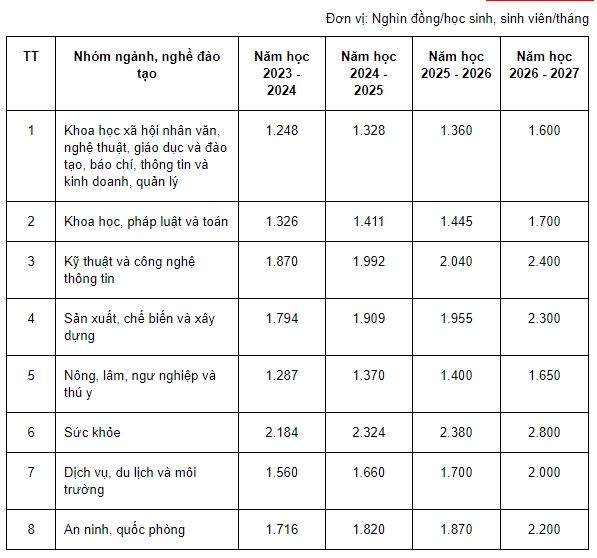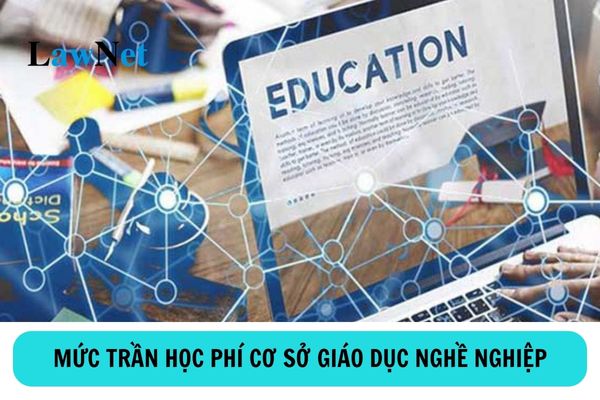What is the tuition cap for public vocational education institutions that have not guaranteed recurrent expenditure entirely in Vietnam for the academic year 2024-2025?
What is the tuition cap for public vocational education institutions that have not guaranteed recurrent expenditure entirely in Vietnam for the academic year 2024-2025?
According to the provisions at point a, clause 2, Article 10 of Decree 81/2021/ND-CP, amended by point b, clause 3, Article 1 of Decree 97/2023/ND-CP, the tuition cap for vocational education for public vocational education institutions that have not guaranteed recurrent expenditure entirely for the academic year 2024-2025 is as follows:


What is the tuition cap for public vocational education institutions that have not guaranteed recurrent expenditure entirely in Vietnam for the academic year 2024-2025? (Image from the Internet)
What are the principles for determining tuitions for public vocational education institutions in Vietnam?
According to the provisions of clause 2, Article 8 of Decree 81/2021/ND-CP, the principles for determining tuitions for public vocational education institutions are as follows:
- Public vocational education institutions partially covering their own recurrent expenditures and public vocational education institutions that are state-funded (hereafter referred to as public vocational education institutions that have not yet ensured recurrent expenditures) determine tuitions not exceeding the tuition cap at point a, clause 1, and point a, clause 2, Article 10 of Decree 81/2021/ND-CP;
- Public vocational education institutions that ensure recurrent expenditures determine tuitions for each discipline according to the adjustment coefficient compared to the tuition cap for vocational education institutions that have not yet ensured recurrent expenditures, as stipulated in clause 2, Article 10 of Decree 81/2021/ND-CP;
- Public vocational education institutions that ensure recurrent expenditures and investment funds are self-determined to set tuitions to cover costs and accumulate as stipulated by the Vocational Education Law 2014 and related documents.
Which students in vocational education institutions receive a 70% tuition reduction in Vietnam?
According to clause 1, Article 16 of Decree 81/2021/ND-CP, the following groups are entitled to a 70% tuition reduction:
Groups that receive tuition reductions and support for tuition payments
- The groups entitled to a 70% tuition reduction include:
a) Students studying traditional and specific arts and culture in vocational education institutions, public and private universities offering cultural and artistic education programs, including: Traditional folk music instrumentalists, Hue traditional music instrumentalists, Southern amateur music instrumentalists, theatre actors, folk music performers, Chau van singers, Bai choi artists, traditional music performers;
b) Students studying specialties such as court music, Cheo, Tuong, Cai Luong, dance, circus; certain physically demanding, toxic, and dangerous vocational subjects according to the list of such vocations regulated by the Ministry of Labor, Invalids, and Social Affairs;
c) Children in kindergarten and students from ethnic minority groups (excluding the very small ethnic minority groups) in particularly difficult villages/hamlets, zone III areas of ethnic minorities and mountainous regions, particularly difficult coastal island communes as regulated by the competent authorities.
...
Thus, students studying traditional and specific art subjects in vocational education institutions will receive a 70% tuition reduction. These subjects include:
- Traditional folk music instrumentalists;
- Hue traditional music instrumentalists;
- Southern amateur music instrumentalists;
- Theatre actors;
- Folk music performers;
- Chau van singers;
- Bai choi artists;
- Traditional music performers.
What are the regulations on the management and use of tuitions in Vietnam?
According to Article 13 of Decree 81/2021/ND-CP, the management and use of tuitions are as follows:
- Public education institutions use tuitions according to the regulations of the Government of Vietnam on the financial autonomy mechanism of public service providers and compile them into the annual financial report of the educational institution per legal regulations.
- Private and non-public education institutions use tuitions based on the principle of self-sufficiency in income and expenditure and are responsible for financial management of their operations. They must organize accounting, pay taxes, and fulfill other financial obligations according to legal regulations.
- Educational institutions manage tuition revenues and expenditures according to policies on accounting, auditing, tax, and financial transparency as required by law; comply with inspection and audit requirements from financial authorities and competent educational management agencies, and ensure accuracy and truthfulness of provided information and documents.
- Educational institutions must announce and publicize tuitions, training costs for each academic year, educational level, tuition increase schedules (if any) for each academic year and projected for the entire course before enrollment or admission.
- Educational institutions are responsible for publicizing and explaining training costs, tuition levels, and tuition increase schedules for each academic year, educational level, course; ensuring transparency in quality assurance conditions as required; and publicizing tuition exemption and reduction policies and levels in the event of natural disasters, epidemics, and force majeure events.

